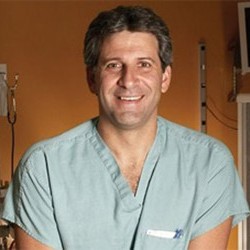
Dr. Jay Wunder
Surgeon-in-Chief, MSH
Dr. Jay Wunder, an award-winning orthopaedic surgeon, researcher and teacher, is Surgeon-in-Chief at Mount Sinai Hospital`s Christopher Sharp Centre for Surgery and Oncology, Head of the Division of Orthopaedic Surgery, Director of the University Musculoskeletal Oncology Unit, as well as Professor of Surgery at the University of Toronto. He is a surgical oncologist specializing in bone and soft tissue sarcomas, including osteosarcoma, a form of musculoskeletal cancer.
Dr. Wunder`s surgical skills are so highly respected that he is called upon to operate on some of the country`s most complex tumours of the musculoskeletal system.
Dr. Wunder continues to lead the multi-disciplinary Sarcoma Program, which is recognized by Accreditation Canada as a Leading Practice. Dealing with some of the most complex cases of the disease, this program is recognized nationally and internationally for achieving the best patient outcomes, development and implementation of new treatment strategies, and translational research.
Mount Sinai Hospital`s Sarcoma training program is one of the largest in the world, attracting many Canadian and international trainees. Almost 100 per cent of all Canadian fellows are trained by Dr. Wunder and his team, and as a result, the standard of practice in the field of sarcoma across Canada continues to rise dramatically.
Dr. Wunder has held several Orthopaedic Oncology Fellowships, and he is the inaugural holder of the Rubinoff/Gross Chair in Orthopaedic Oncology.
His many awards for teaching include the Robert Salter Teaching Award (University of Toronto), the Wightman Berris Academy Teaching Award, and the Bruce Tovee Teaching Award. He is the recipient of numerous research grants such as the prestigious Orthopaedic and Research Education Foundation Kappa delta Research Award, the highest award in Orthopaedic Research in North America.
As an Associate Member of the Lunenfeld-Tanenbaum Research Institite, Dr. Wundercollaborates with Dr. Irene Andrulis and other Lunenfeld-Tanenbaum colleagues to develop Canada`s most extensive sarcoma tissue bank (which also houses protected clinical data), to help determine the relationship between genetic mutations in tumours and clinical outcomes.
This collaboration also extends to their involvement in team grants such as those from the National Institutes of Health, as well as their involvement in large-scale sequencing projects. For example, a new project includes collaboration with researchers in British Columbia and internationally, and is designed to assess changes in the tumours of osteosarcoma patients and how these changes affect outcomes, as well as how more individualized therapies can be designed and targeted to unique tumour types.


